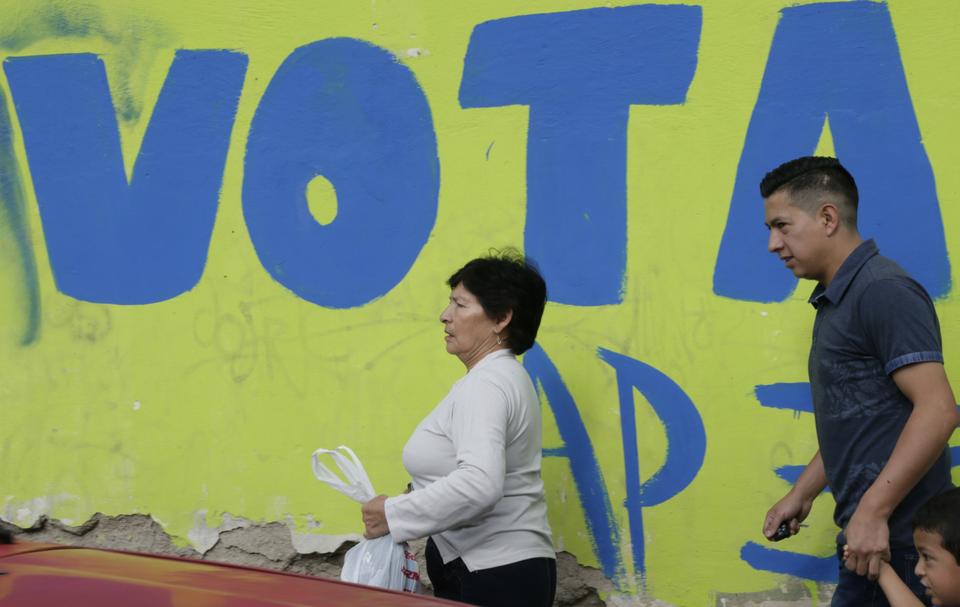Ecuador voters bar ex-president Correa from comeback
Interim results of Sunday’s referendum show 64 percent of ballots in favour of restoring the measure which prevents presidents from running indefinitely, effectively barring ex-president Rafael Correa from making a comeback.
Ecuadorans on Sunday voted to bar ex-president Rafael Correa from being able to make a comeback in 2021 by unmistakably backing a referendum question on reimposing presidential term limits.
Initial results from the plebiscite called by Correa’s successor-turned-foe, current President Lenin Moreno, showed 64 percent of ballots in favour of restoring the measure which prevents presidents from running indefinitely.
Correa had scrapped it in 2015.
Virtually as many – 63 percent of ballots – also approved restructuring a body Correa had set up to select authority figures such as judges, effectively wiping away the ex-president’s legacy over the state.
Minutes before the National Electoral Council gave the numbers, Moreno hailed the “clear and overwhelming victory.”
The results signified a win for Moreno in his struggle with Correa for control of their deeply divided leftist ruling Country Alliance party.
“The confrontation is behind us. Now is the time for us to return to stand together,” the president told supporters.
Sunday’s referendum featured seven questions, including the measure on reintroducing term limits.
That measure means Correa will not be able to challenge Moreno for the presidency in two years’ time.
Struggle continues
The outcome was predicted by surveys ahead of the referendum – although most had projected even bigger support for Moreno’s “yes” camp of between 72 and 84 percent.
Correa alluded to that margin in a tweet after the results came out, saying no movement has ever done so well against such odds, “more so in such little time and in such an unequal fight.”
He vowed that “the struggle continues. We can’t accept a state under the rule of law with such a big break constitutionally.”
 People arrive at a voting center during a constitutional referendum called by President Lenin Moreno in Quito, Ecuador. (AP)
People arrive at a voting center during a constitutional referendum called by President Lenin Moreno in Quito, Ecuador. (AP)
The exchange presaged more manoeuvres ahead between the ex-president and his successor.
Moreno had said when he voted in the north of the capital Quito that a triumph would ensure that “corrupt people do not return to mock us.”
Since taking office in May last year, he has repeatedly cast Correa – whom he served as vice president between 2007 and 2013 – as corrupt and a proponent of “21st century socialism.”
Correa, who ruled for a decade from 2007, for his part has branded Moreno a “traitor” and the vote “unconstitutional,” denouncing the president for wanting to achieve “absolute rule.”
Far from keeping Correa’s presidential seat warm as expected, Moreno’s calling of the referendum instead spelled an intention to clear a way to a post-Correa era.
Moreno, 64, only narrowly defeated conservative banker Guillermo Lasso in the last election in April 2017.
Court appearance
Correa maintained that with a question over whether those convicted of corruption should be barred from politics, Moreno was trying to erect legal pretexts to prevent him re-entering office.
“They will invent a crime against me to disable me. It is the right’s new strategy to destroy progressive leaders,” Correa, 54, previously said.
That issue of corruption allegations against Correa will be to the fore on Monday, when the former leader – who returned to Ecuador from Belgium in January to embark on a solo campaign against the referendum – is expected to appear in court.
He has been called to testify over alleged irregularities in million-dollar oil sales to China and Thailand made during his tenure.
His former vice president, Jorge Glas, was sacked by Moreno following his re-election and sentenced to six years in jail for corruption.










